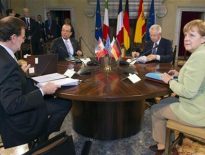(Reuters) – Republican presidential candidate Mitt Romney would move aggressively to open up more foreign markets for U.S. exports, while getting tougher with China on its trade and currency practices, Senator Rob Portman said on Tuesday.

The potential Romney vice presidential running mate said President Barack Obama has allowed the United States to fall “behind in a very significant way (on trade) because we are not engaging in opening up markets virtually anywhere.”
In contrast, Romney has taken “a sensible approach on trade, which is to be much more aggressive on the export side, but also with a mature trading partner like China, making it clear that we’re going to have rules that we all live by,” Portman said at the Reuters Washington Summit.
Portman, who served as U.S. trade representative and then White House budget director under former President George W. Bush, faulted Obama for being “the first president since Franklin Delano Roosevelt not to ask for the ability to negotiate trade-opening agreements.”
“I’ve talked to Romney about this … He’s for immediately changing our trade policy to access the 95 percent of consumers that live outside of our borders by being aggressive on trade openings. He’d get trade promotion authority from Congress and then begin serious negotiations to open up markets.”
Trade promotion authority, which is also known as “fast-track” trade legislation, allows the White House to negotiate trade deals that it can submit to Congress for a straight up-or-down vote without any amendments.
CHINA UNFAIR
Romney would balance his push for more free trade agreements with a tough trade enforcement agenda, focusing especially on China, Portman said.
He defended Romney’s pledge to crack down on China’s currency practices by quickly declaring them a currency manipulator, even though that worries some business groups who fear it would provoke Beijing to retaliate.
“I think it put pressure on the Chinese to do the right thing” and allow their currency to rise more quickly in value against the U.S. dollar, Portman said.
China’s undervalued exchange rate makes Chinese exports cheaper than they should be in world markets, while boosting the price of U.S. goods in China, Portman said.
“It’s simply unfair. They’ve obviously done very well in terms of the U.S. market and all we’re saying is play by the rules,” Portman said. Last year, Portman voted for a bill that would treat undervalued currencies as a subsidy under U.S. trade law and allow the imposition of countervailing duties.
Both Obama campaign and administration officials responded to the criticism, noting U.S. exports are up 36 percent since early 2009 and on track to meet Obama’s goal of doubling annual exports to more than $3 trillion by the end of 2014. Obama also created a new interagency enforcement center to go after China and other countries that violate global trade rules, they said.
“Mitt Romney has already made clear he’d stand with China instead of American workers, investing in companies that were outsourcing pioneers and criticizing the President for enforcing trade laws against China,” campaign spokesman Ben LaBolt said.
The last point referred to a line in Romney’s 2010 book “No Apology: The Case for American Greatness,” where the candidate criticized Obama for imposing tariffs on Chinese tires to stop a surge in imports. The September 2009 decision was controversial, but later deemed legal by the World Trade Organization.
“President Obama’s action to defend American tire companies from foreign competition may make good politics by repaying unions for their support of his campaign, but it is decidedly bad for the nation and our workers. Protectionism stifles productivity,” Romney said in the book.
FAST TRACK TO THE PACIFIC
The trade promotion authority Romney would seek has long been considered essential for the United States to negotiate trade deals on the theory that other countries will not put their best offers on the table unless they are confident that Congress will not change the pact.
However, it is unpopular with labor groups – key Obama supporters – because they believe trade deals encourage U.S. companies to move jobs overseas.
Even without the authority, the Obama administration is pursuing a free trade agreement known as the Trans-Pacific Partnership (TPP) with 10 other nations in the Asia-Pacific region.
Those negotiations date back to the last years of the Bush administration, although Obama relaunched the talks in 2010 after an extensive review.
U.S. Trade Representative Ron Kirk has said the White House would ask Congress for trade promotion authority before submitting the Trans-Pacific pact to Congress for a vote.
Portman said he supported the proposed deal but believed it would be difficult to win significant new market-opening commitments in a negotiation with so many countries involved.
“Bilateral (trade agreements are) where you make the progress and we’re not doing anything,” Portman said.
Carol Guthrie, a spokeswoman for Kirk’s office, pushed back on that point, saying “all of the TPP partners are expressly committed to a high-standard agreement that tackles old issues in new ways, and addresses new issues creatively. The Obama administration has insisted on nothing less from day one.”
Still, Obama has not launched any bilateral free trade agreements since taking office in 2009, and only sent Bush-era free trade pacts with South Korea, Colombia and Panama to Congress in 2011 after negotiating a number of changes to make the agreements more acceptable to Democrats.
Portman said Romney would likely pursue a bilateral free trade agenda much like Bush, who negotiated free trade deals with Australia, Bahrain, Chile, Colombia, South Korea, Morocco, Oman, Peru, Singapore and Panama.
Bush also negotiated a regional free trade agreement with the Dominican Republic and five Central American countries.
Follow Reuters Summits on Twitter @Reuters_Summits
(Reporting by Doug Palmer; Editing by Anthony Boadle)





